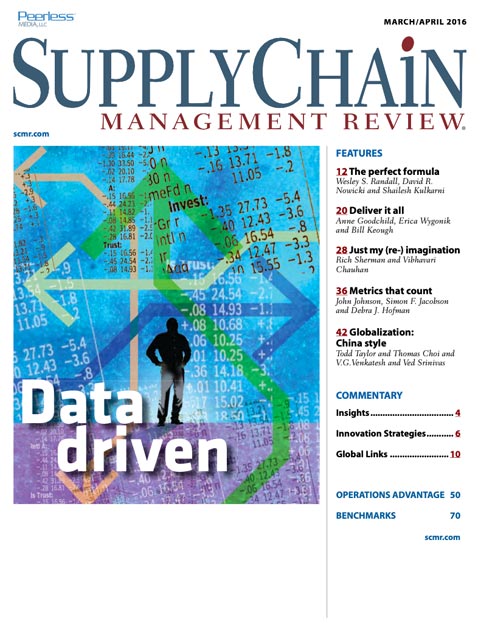Sorry, but your login has failed. Please recheck your login information and resubmit. If your subscription has expired, renew here.
March-April 2016
When I visit my millennial-aged daughter in Chicago, I’m amazed at the number of packages dropped off by UPS, FedEx and the USPS at her three-unit building on a daily basis. It’s as if she and her neighbors are single-handedly keeping Amazon in business. All those drop-offs got me to wondering: Does any of this make sense if you think about a carbon footprint? Rather than deliver millions of packages to one address at a time every day, wouldn’t it be more sustainable if we all just drove to the mall to do our shopping? After all, doesn’t research indicate that a signi cant percentage of consumers, especially millennial consumers like my… Browse this issue archive.Need Help? Contact customer service 847-559-7581 More options
The complexity of modern supply chains and the advancement of technology in the field have led organizations to place greater importance on the need for supply chain employees to possess STEM (science, technology, engineering and math) skills. APQC has found that a slight majority of organizations look for STEM skills in their new hires for supply chain positions. The most highly sought after of these skills are engineering and operations research, or the use of analytics to optimize transportation networks.
As in many fields, STEM skills are not widely available or fully developed among supply chain professionals. APQC has found that some organizations are tackling this problem by creating development programs for new professionals.
However, lasting solutions provide development of STEM skills among both new and more tenured employees. Some organizations have found this balance and seen positive results for the business.
 |
This complete article is available to subscribers
only. Click on Log In Now at the top of this article for full access. Or, Start your PLUS+ subscription for instant access. |
SC
MR
Sorry, but your login has failed. Please recheck your login information and resubmit. If your subscription has expired, renew here.
March-April 2016
When I visit my millennial-aged daughter in Chicago, I’m amazed at the number of packages dropped off by UPS, FedEx and the USPS at her three-unit building on a daily basis. It’s as if she and her neighbors are… Browse this issue archive. Access your online digital edition. Download a PDF file of the March-April 2016 issue.
 |
Download Article PDF |
The complexity of modern supply chains and the advancement of technology in the field have led organizations to place greater importance on the need for supply chain employees to possess STEM (science, technology, engineering and math) skills. APQC has found that a slight majority of organizations look for STEM skills in their new hires for supply chain positions. The most highly sought after of these skills are engineering and operations research, or the use of analytics to optimize transportation networks.
As in many fields, STEM skills are not widely available or fully developed among supply chain professionals. APQC has found that some organizations are tackling this problem by creating development programs for new professionals.
However, lasting solutions provide development of STEM skills among both new and more tenured employees. Some organizations have found this balance and seen positive results for the business.
 |
SUBSCRIBERS: Click here to download PDF of the full article. |
SC
MR

Latest Supply Chain News
Latest Resources

 Explore
Explore
Topics
Latest Supply Chain News
- How to improve demand forecasts for new product families
- Services sector sees growth in October, reports ISM
- Balanced supply chain management Part 4: The key—leading beyond the silo
- Managing inbound freight: What has changed in two decades?
- Inbound freight: Often a missed opportunity
- Aggregators sitting on the throne of Africa’s e-commerce supply chains: What lessons can we learn?
- More latest news
Latest Resources

Subscribe

Supply Chain Management Review delivers the best industry content.

Editors’ Picks





